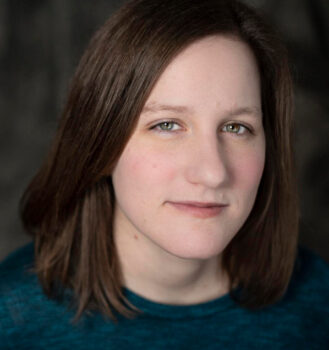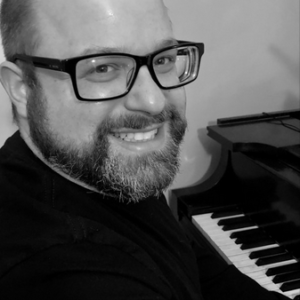Our friends at the Madison Choral Project professional chamber choir have suspended their season indefinitely until it's safe to sing again. Their stunning pandemic-themed video, "Awakening" bears another look. It is - sadly - still timely.
Author: Choral Arts Webmaster
Jennifer Hedstrom

Jennifer studied at Illinois State University, and later the graduate music program at the University of Wisconsin-Madison.
She has written and performed songs that appear on compact discs and received enthusiastic response.
Her website is http://jenniferhedstrom.com.
Erin Crabb Zipper

Erin Crabb is a freelancing accompanist, music director, and piano teacher residing in Madison.
She has worked in various such capacities with the Children’s Theater of Madison, Fresco Opera, Madison Theatre Guild, UW Theatre, Opera For the Young, Edgewood College, and Four Seasons, and works closely with Theatre LILA as a composer and collaborator.
Erin especially enjoys her extensive work with the music and theater students at UW Madison and also teaching privately from her home.
Choir Jokes
Choir Jokes
Ok, which ones should be scrapped? Let us know! Caution, some of these are prickly.
Q: How do you tell when your lead singer is at the door?
A: He can’t find the key and doesn’t know when to come in.
Q: How many lead singers does it take to change a light bulb?
A: One. He holds the bulb while the world revolves around him.
Q: Did you hear about the female opera singer who had quite a range at the lower end of the scale.
A: She was known as the deep C diva.
Q: How many tenors does it take to change a light bulb?
A: Six. One to do it, and five to say, “It’s too high for him.”
Q: What’s the inscription on dead blues-singers tombstones?
A: “I didn’t wake up this morning…”
Person 1: It must be terrible for an opera singer to realize that he can never sing again.
Person 2: Yes, but it’s much more terrible if he doesn’t realize it.
Q: Why was the soprano arrested?
A: Because she was in treble.
Q: Why were the singers locked out of their rehearsal room?
A: They missed the key change.
Q: Dad, why do the singers rock left and right while performing on stage?
A: Because, son, it is more difficult to hit a moving target.
Q: Mom, why do you always stand by the window when I practice for my singing lessons?
A: I don’t want the neighbors to think I’m employing corporal punishment, dear.
Q: How many altos does it take to change a light bulb?
A: None. They can’t get up that high.
What is the definition of a mezzo soprano?
Just an alto with a soprano’s attitude.
What’s the definition of a male quartet?
Three men and a tenor.
What’s the definition of an alto?
A soprano who can sight read.
What’s the difference between an alto and a tenor?
Tenors don’t have hair on their backs.
How do you tell if a bass is actually dead?
Hold out a check
How many basses does it take to change a lightbulb?
None. They’re so macho they prefer to walk in the dark and bang their shins.
What is the difference between a high school choral director and a chimpanzee?
It’s scientifically proven that chimpanzees are able to communicate with humans.
Why can’t you hear a soprano on a digital recording?
Recording technology has reached such an advanced level of development that all extraneous noise is eliminated.
Opera is when a guy gets stabbed in the back and, instead of bleeding, he sings.
Her final note has now been sent,
Her final chord’s undone.
After life’s gloom, death should present
Her moment in the sun.
Alas, she has the worst of fates –
She must in Limbo stay
And wait outside the Pearly Gates
Forever and a day.
She’s not shut out because of sin
Her virtue’s plain to see.
It’s just… she never knew when to come in,
And could never find the key.
[found on the page before the mystery “The Killer in the Choir” by Simon Brett]
Music Jokes
Definition of Perfect Pitch: Throwing a banjo into the trash landing perfectly onto a bagpipe.
After the rehearsal, a viola player went to the nearby restaurant. Leaving her viola in the car, she went in. She was aghast later when she remembered the car was unlocked. She raced to the car. But, by now there were FOUR violas in the car.



Choral Arts Notes 1
“By the River” by Scott Gendel
“By the River” (music: Scott Gendel, text: Helen Hoyt) for SATB choir and piano. Commissioned by the Choral Arts Society Chorale, and premiered on Sunday, April 28, 2019 at Trinity Lutheran Church, Madison, WI. Music Director: Mikko Rankin Utevsky – Accompanist: Yana Avedyan.
The best way to describe this exciting work is to read Scott’s words…

“When the Choral Arts Society Chorale asked for a piece relating to water for their innovative concert about water and conservation in our region, I was quickly overwhelmed by the huge amount of material available to me. There’s just so much poetry and music about water, it’s hard to know which angle to take. But when I ran across Helen Hoyt’s little-known poem, I fell in love. Hoyt’s words manage to capture the danger and overwhelming power of rivers while also beautifully capturing how being immersed in water can feel transformative on a deep personal level. I wanted to capture that contrast in my music, and so this piece roars along dramatically like a rushing river, but also explores the sense of emptiness & calm left behind after the river rushes by.” – Scott Gendel
We were thrilled to sing it at our Spring 2019 concert. Each voice had a strong part to play in interpreting Scott’s piece. A recording of this composition is not yet available. Deep thanks of appreciation are extended to the generous contributions in support of the commission of this work: Ruth Brill, Danny Proud, Dean Schroeder and John W. Webber.

She was a guest editor for the September 1916 issue of “Others: A Magazine of the New Verse” (New York City). In the introductory “Retort,” she wrote, “At present most of what we know, or think we know, of women has been found out by men, we have yet to hear what woman will tell of herself, and where can she tell more intimately than in poetry?”[1] [2] Helen Hoyt interests included nature, love, mystery, beauty, the body and gender in her poetry, typically lyric.[3]
By the River
Wash from me all my weariness, waters;
Wash from me all my thoughts and purposes;
Wash from me all my desires and dreams and hopes,
And drown them in your torrents!
Oh, take me from myself and let me lose myself!
Let this incessant churning against the rocks,
This clumping, clumping, clumping of the water
Wash over my brain and wash my brain away!
Wash from me all my weariness, waters…
‘Til I am left at last empty of all that I was
All that I knew or was or wished to be;
Left empty and content and uncontending;
Languorous and numbed and lulled asleep.
More information about Scott’s other compositions and activities is available on Scott’s web site. It’s a treasure of accomplishment. Scott is indeed a Madison musical resource!
Choral Arts Notes is sent periodically to our subscribers. All are encouraged to visit the “Subscribe” page to subscribe. Choral Arts Society Chorale (CASC) musical activities are highlighted in these issues. Subscribers, especially CASC members, are invited to submit articles for future issues.

